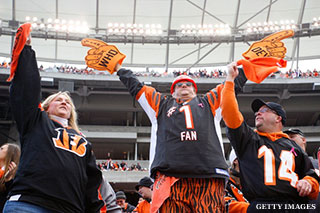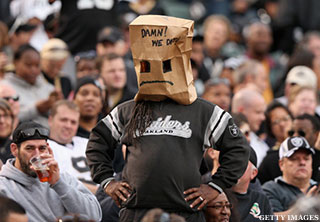By Jason Notte
The Street
Number of weeks gone by in the NFL season? Thirteen. Number of home game blackouts? Twelve. Happy holidays, fans.
The National Football League was supposed to be entering a game-changing season for its television blackout policy, which dates back to an act of Congress in 1961. The act prevents home games from showing on TV stations that broadcast within a 75-mile radius of the stadium if tickets aren't sold out 72 hours before kickoff. This summer, after the Federal Communications Commission agreed to review the policy, the NFL took its first step away from those restrictions. Under new rules, teams would be allowed to broadcast games within their local coverage area even if only 85 percent of tickets are sold.

Unfortunately, it was up to the teams' owners to decide if they want to adopt that 85 percent threshold. The Tampa Bay Buccaneers adopted the lower "sellout" mark in July and lowered ticket prices after blacking out 13 of their past 15 home games. The Oakland Raiders, Miami Dolphins and Minnesota Vikings have since followed suit, but the Buffalo Bills, Cincinnati Bengals and San Diego Chargers didn't feel quite as strongly. Those three teams stuck to the 100 percent mark despite blacking out games in each of the past two seasons and trying to get taxpayers to pony up for stadium construction and improvements.
But shaming local ownership was the entire point of that new rule. It was designed to divert attention away from the NFL just after it inked television deals with ESPN, ABC, NBC, CBS and Fox that will boost NFL revenue more than 60 percent by 2022 -- and places the heat right on the individual teams and their owners. The league revised its blackout rule despite watching its blackout rate drop to 6.3 percent last year from 8 percent between 2001 and 2010, 31 percent in the 1990s, 40 percent in the 1980s and 50 percent in the 1970s. By doing so, it issued a subtle reminder that only some of the 31 teams who took public money to build their stadiums are denying fans access to the on-field action.
As we enter the holiday season and the waning weeks of the NFL season, we see that the NFL's new blackout regulations didn't do much at all. Blackouts are still happening and teams are still trying to shake down their markets for every penny they can get.
With that in mind, we took a look around the league this year and came up with a "naughty" list of five teams who kept fans from seeing games this season. We'd put coal in their stockings, but they'd probably just threaten to move them to another chimney if they don't get toys instead:
Tampa Bay Buccaneers
Blackouts this season: Five
That's five of six home games blacked out already this season and a whopping 18 home games that haven't been televised in the Tampa area during the past three seasons.
The only game the team sold out this year was a home loss to the New Orleans Saints, their division rivals. By accepting the new blackout threshold and tweaking ticket prices, Buccaneers management made the argument they were doing all they could to keep the team on the air. They weren't buying up tickets for a third of the price and giving them to charity -- a loophole exploited by several other NFL squads -- but that's their prerogative.
Still, Tampa Bay's acceptance of the blackout deal never quite smelled right. That 85 percent attendance threshold is nice and all, but attendance at eight of the team's 13 blacked-out games in the past two seasons fell below that mark. The team's slide from a 10-6 playoff contender in 2010 to a 4-12 team adrift last year to a 6-6 snoozefest under new head coach Greg Schiano this season hasn't exactly jolted the fan base, which is now used to not seeing its team on television for much of the year. Anger's given way to resignation, and that's a dangerous thing for any team still looking for an identity.
San Diego Chargers
Blackouts this season: Three
Team ownership hates its stadium and its deal with the city and the team's fans and San Diego officials hate ownership right back.
This team sold out 48 straight games through 2010 but started blacking out games as key players left and the Spanos family of team owners sought a new stadium from San Diego and other California cities. As Los Angeles and Chula Vista lick their chops, the Spanos family is all too happy to black out the fans who refuse to pack Qualcomm Stadium as the team drifts further into mediocrity. This year's record so far: 5-8.
"We're in one of the oldest stadiums in the league, and don't have opportunities that other teams have to increase revenue with things like a bigger naming rights deal or digital signage," executive vice president and CEO A.G. Spanos told the North County Times. "We rely heavily on ticket sales as a primary revenue stream. This market has shown an ability to sell out games over the last 10 years, and we need to take advantage of that."
San Diego has extended the Spanos family its longest digit in response.
During this year's mayoral debates, San Diego mayoral candidates U.S. Rep. Bob Filner and Carl Demaio vowed they would not devote public subsidies toward a new Chargers stadium if elected. Newly minted Mayor Filner was even more forceful, saying, "Enough of the extortion from our sports teams, whether they be the Padres or the Chargers." He later added "no extortion of the public money by the San Diego Chargers when I'm mayor."
Filner also stated, "I would like to see San Diegans have part ownership of the team." When asked how this was possible since NFL rules prohibit public ownership, Filner said, "The NFL is not the Ten Commandments; it's not the Constitution of the United States. NFL rules can change."

Corporate sponsors including the team's local CBS affiliate bought out tickets and kept the Chargers' Nov. 1 matchup with the Kansas City Chiefs on the air, but they've had two home games blacked out since.
With the Denver Broncos already clinching the division title in the AFC West and the Chargers dropping their past four games, a run to 8-8 seems unlikely.
The blackouts may not be over, but the love affair between San Diego and the Chargers may well be.
Cincinnati Bengals
Blackouts this season: Two
Those two blackouts this season are still far better than the six the team posted last year and the 10 games they've taken off of TV in the last two.
In fairness, fans have had a lot to complain about for some time. The team threatened to move in 1995 if they didn't get a new stadium, which ended up costing Hamilton County, Ohio, $540 million. That debt climbed as the recession deepened and expanded to a $30 million budget deficit this year alone. Add annual stadium costs to taxpayers that rose from $29.9 million in 2008 to $34.6 million in 2010 and sales tax revenue that's declined steadily since 2000 and you get crushing debt that eliminates funding for programs such as a juvenile court and rolls back the property tax cut promised as part of the stadium deal.
The good news is that quarterback Andy Dalton and the Bengals have at least given fans something to watch this year. While we're still not exactly sure how the team didn't sell out its Nov. 11 matchup with the defending Super Bowl champion New York Giants, they were good enough to win that game and reel off three more wins in a row to salvage the season. The Bengals didn't take the blackout deal this year, but the team's performance may have management reconsidering that stance in 2013.
Oakland Raiders
Blackouts this season: One
Oh, Oakland, don't do it this way.
We know you were thinking about joining the 49ers at their new stadium in Santa Clara or maybe even getting a new stadium of your own in Dublin, Calif. We know Raiders fans are used to multiple home game blackouts a year after sitting through dozens of them since the team moved back from Los Angeles in the 1990s. We know the lease on the poorly named O.coColiseum is up in 2013.
But you're different now, right? New owner Mark Davis isn't his father, Al, and really wants to make it work in Oakland. He even accepted the 85 percent attendance threshold for lockouts.

But ghosts of the bad old Raiders are resurfacing. The team blacked out its Sunday home game against the Cleveland Browns for its first blackout in 13 home games. The Raiders have lost five straight and are 3-9 going into their matchup with the AFC West champion Denver Broncos. These are dark days for a franchise that's seen a lot of them, and those silver and black uniforms are starting to look more like mourner's clothes with each setback.
Buffalo Bills
Blackouts this season: One
The team has a 5-8 record and is about to continue its string of non-winning seasons dating back to 1999. One of its "home" games has been played in Toronto for each of the past four years. Ninety-two-year-old owner Ralph Wilson says he can't guarantee the team's future in Buffalo, N.Y., after he dies.
Combine all that and it's little wonder the Bills struggle to fill the 73,000-seat Ralph Wilson Stadium in the dead of winter. The team blacked out all three of its home games last December and needed a local businessman to step in and buy out tickets to keep its last home game of 2010 on the air on the day after Christmas (the same businessman just kept this weekend's game against the St. Louis Rams on air as well). Game-time temperature in Buffalo for that last game in 2010 was 22 degrees.
The Chicago Bears need to draw less than 62,000 to sell out Soldier Field in a far larger market, but Bills management doesn't want to hear any of it. The Bills want the public to pay for more than $200 million in stadium renovations and declined the NFL's offer to lift blackouts at 85% capacity, largely because doing so would require it to pay $90,000 per home game into the league's anti-blackout revenue pool.
Each year Bills fans make a wish list. Each year, they're lucky if they even get a game on TV for Christmas (last year's Christmas Eve home game against the Denver Broncos was blacked out). Bills fans' blood is thick, but their patience is wearing thin.
More From The Street
-- 10 Best Gift Cards for Holiday Shopping
-- 10 Classic Video Games Still Raking In Cash
-- 5 Cars With the Best Resale Value




